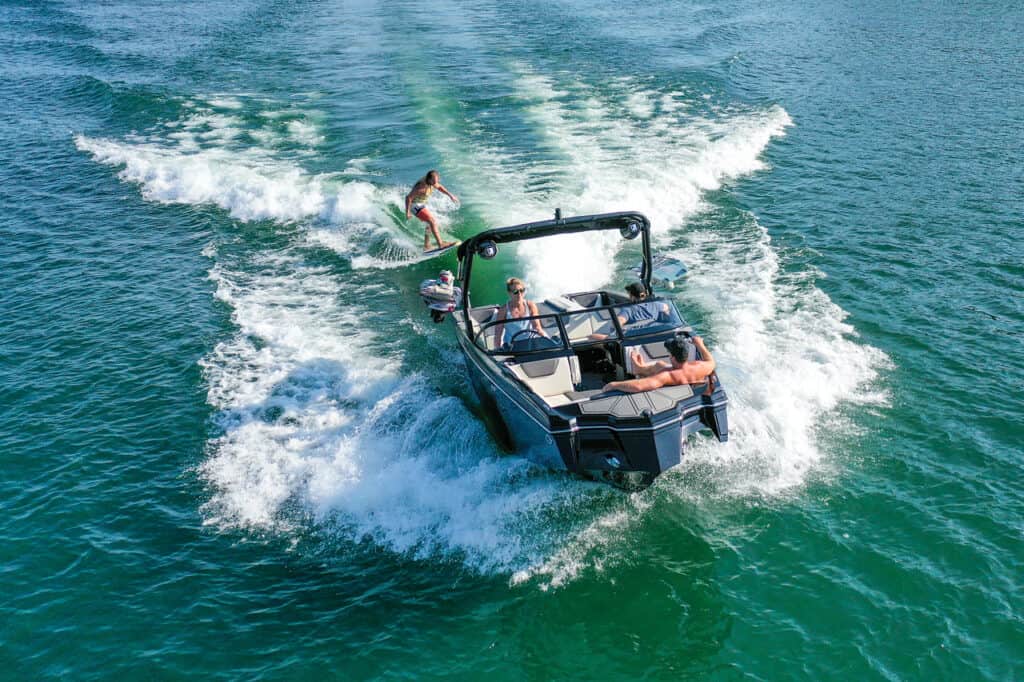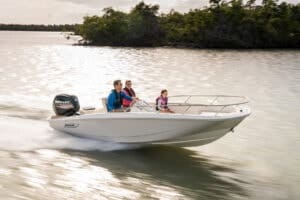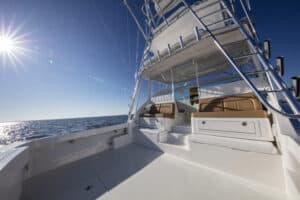Boats are known for being luxury purchases that aren’t necessarily accessible to everyone. However, they’re also known for creating a ton of timeless memories. They can provide hours of fun in the sun, help introduce you to watersports, and take you to destinations you may have never seen before; and probably never even heard of. Hello remote, uninhibited island in the Bahamas. If you’re already convinced to become a boat owner and need financing, learn how we do boat loans at Trident Funding.
Boat ownership encourages you to spend more time on the water soaking up all of the benefits of being outside. All in all, boats provide a source of enjoyment and are a favorite pastime of many marine enthusiasts. However, it depends on who you ask, whether or not boats are a good investment.
Let’s take a shallow dive into what exactly makes something a good investment. Typically, an investment is an asset that is expected to appreciate and/or generate some kind of income. Common investments include stocks, bonds, mutual funds, and real estate. However, anything that has the potential to appreciate and/or make money can be an investment.
For example, cars are not usually considered good investments, but if you use your car for a ride share service or rent it out on rental sites, then your car may actually be a good investment. The same can be said for boats. Although boats can come with a hefty price tag, and expensive operating costs, they can also generate income through a number of ways especially if you take good care of your boat and keep it clean, serviced, and maintained over time.
If you decide that a boat is a good investment for you, and you want to enjoy all of its many benefits, then apply for a boat loan with Trident Funding. They’re one of the largest and most experienced marine financing companies in the U.S. They help you sail through the entire application process, assist with Coast Guard documentation, and walk you through closing as well.
Why is a Boat a Good Investment?
Is a boat a good investment? That really depends on who you ask. The disgruntled boat owner who recently had to purchase a new engine and pay for a litany of expensive repairs may say no. However, a fisherman who makes his living catching fish offshore would say boats can be great investments.
Before purchasing a boat, you need to figure out how much boat you can afford. How much money do you have saved to put towards a downpayment? Typically, a boat loan requires at least 10% down, but many require 20% or more down depending on your credit score and overall financial profile. Additionally, can you afford the monthly payment for the boat loan? Check out a free online boat loan calculator to get an estimate of what your monthly payment will be.
Now, you know more about down payments and monthly payments, but you’re not quite done yet. You still need to be able to afford to insure the boat, store it somewhere, get it cleaned, serviced, and stay up to date with maintenance and repairs. You may also want to buy some accessories or water toys to go along with your boat.
Don’t let all those costs overwhelm you, because although there are plenty of boats that will run you six or even seven figures, there are also many more affordable boats out there. Luckily boats come in all different shapes, sizes, and price ranges, so they may be more affordable than you think. For instance, you may be able to purchase a pre-owned deck boat, starter jet boat, or a small fishing boat for as low as $30,000.
Purchasing the boat at a discounted price, buying a ‘project boat’ if you know how to fix it up, or buying a boat that isn’t the newest model may make the boat more of a ‘good investment’. If you buy the boat for less than it’s worth originally, you will have less risk, more equity, and less overall depreciation down the road…or in this case…down the sea.
If you want to buy a boat, and need help paying for it, consider a boat loan. You can easily apply online with Trident Funding. They can help you through the application process all the way until you get to the closing table. They finance new and used boats from $25,000 all the way up to $2 million dollars.
It’s good to know that boats can be affordable, but let’s get into purchasing a boat as an investment, specifically a good investment. Boats purchased as an investment are typically used for:
- Deep sea fishing
- Fishing charters
- Yacht charters: Including overnights
- Island hopping; experiencing new places
- Watersports: Tubing, wakeboarding, water skiing, and snorkeling etc.
- Daily cruises including sunset, whale, and dolphin cruises, harbor cruises, local waterways tours, and more
- Venue rentals: Rent a yacht for the evening to host a party or event
- Short-term vacation rentals: A more niche market that is increasing in popularity
But it’s not all numbers, when it comes down to determining if a boat is a good investment or not. Your lifestyle, overall goals, leisure activities, and how you want to spend your time can all have an impact on whether or not a boat is a good investment for you. Boats can also be good stress releases and provide quality leisure and relaxation time which can help with your work-life balance.
You can’t put a price tag on happiness, memories, and quality time with your friends and family. Breathtaking pink and orange hues streaming over the sparkling Atlantic Ocean, dolphins jumping around near your boat, checking out the best waterfront restaurants, waking up and only seeing the blue blue ocean in all directions, catching your dinner, and loving the adrenaline rush of getting up on your skis for the first time. Those are all things to consider, when asking yourself is a boat a good investment, in addition to the financial costs that come with boat ownership.
Why a Boat Is Not a Good Investment?
So, we’ve discussed how boat ownership can be a good investment, but let’s tackle the flip side of this. Purchasing a boat, taking care of your boat, and maintaining your boat can all add up over time. In fact, spending time on the water can be quite an expensive hobby.
When compared to other good investments, owning a boat doesn’t usually stack up. Unless you use your boat as a business, or have the extra disposable income that owning a boat doesn’t affect your lifestyle or your other investments, it’s not necessarily a solid investment money-wise. The return on your investment is most likely going to be more of an emotional or pleasurable return rather than an actual monetary return if you’re a recreational boat owner.
Boats also depreciate, so unlike with real estate that has a history of appreciating over time, you’re going to be left with a vessel that over time, is worth less than what you paid for it. In fact, most boat owners take a financial loss when selling their boat.
Boat depreciation curves vary depending on whether or not you purchased the boat new or used, and what make, model, and size of boat you bought, as well as how you maintain it. Typically, boards depreciate by about 10-15% over the first year, 20-30% by the fifth year, and 30-40% by the tenth year. Then the depreciation slows down.
Two factors that affect the value of boats are their hours and their engines. The more hours a boat has on it means the more it was driven, so the more worn out the engine will be. This means that the engine will need to be rebuilt or replaced; thus decreasing the overall value of the boat.
Boats that aren’t well maintained are also less valuable than well-maintained and properly stored boats. No one will pay top price for a boat with rust on the bottom, a torn bimini top, and rips in the upholstery.
Invest Elsewhere to Offset the Cost of Boat Ownership
If you still want to purchase a boat because the pros outweigh the cons for you, then consider some other ‘good’ investments to offset some of the costs of boat ownership. You can invest in stocks and bonds, or invest in a startup, or even start your own business. Consider working overtime, turning your hobby into a business, or getting a second job. Another investment that stands the test of time is real estate. You can invest through a REIT, through real estate crowdfunding sites, or you can buy an investment property and take advantage of appreciation over time and monthly rental income.
Alternatives to Purchasing a Boat But Still Spending Time on the Water
If you just can’t afford to purchase your own boat at the moment, there are some alternatives to boat ownership. They include:
- Rent a boat from a local marina for the day
- Charter a boat
- Go on fishing excursions
- Take frequent cruises
- Join a boat or yacht club to have access to their fleet of boats for a cost
- Make friends who own boats!
- Co-own a boat with a friend or family member so you split the associated costs
The Wrap Up: Is a Boat a Good Investment?
Is a boat a good investment? This is quite a subjective question and really depends on who you ask. Financially speaking, a recreational boat isn’t necessarily a good investment compared to other tried and true investments like stocks, bonds, and real estate. However, buying a boat for business purposes or for your enjoyment might make it a good investment for you. If you can afford to purchase the boat, insure it, properly store it, and maintain it, and you enjoy it…well that’s all that matters!
Frequently Asked Questions
What are the Downsides of Owning a Boat?
The downsides to owning a boat are:
- The initial cost of purchasing the boat: Including a down payment, lender fees, registration, and inspections
- Ongoing costs: Monthly boat loan payments if applicable, boat insurance, sea tow membership, maintenance, cleaning, storage, marina fees, fuel, and more
- Its depreciation over time
- Only being able to use it when weather and time permit or when the marina is open
- Can be dangerous if you are unprepared, inexperienced, or run into inclement weather
Can You Write a Boat Off On Your Taxes?
This can be a complex question and it’s best to ask your accountant about tax specifics when it comes to boat ownership. However, if the boat is your primary or secondary residence, it can usually be written off on your taxes. In fact, you may be able to take advantage of the same tax deductions as homeowners who live on land.
Additionally, if your boat is used as a business, such as a fishing charter boat, then you can deduct business expenses on your taxes. These may include things like fuel, maintenance costs, docking fees, repairs, and boat insurance. Keep in mind that you will need to prove that your boat is in fact used for business purposes.





